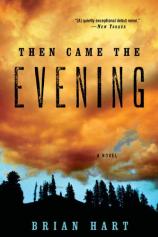Reading Group Guide
Discussion Questions
Then Came the Evening

1. Then Came the Evening begins and ends with house fires, and Bandy also dreams of a mill fire from Lake Fork’s history. Discuss who set each fire, and why: Bandy and Iona’s cottage, Tracy’s restoration of his grandparents’ home, and the old mill fire. What is destroyed in each of these blazes, and what is rebuilt?
2. Describe the opening scene of the novel, when Bandy Dorner commits the crime that changes his life. Why is Bandy so violent when he awakes in the canal? How does the situation escalate so quickly into murder? How does Bandy look back on this incident during and after his jail sentence?
3. On her way toward a new life with Bill, Iona thinks, “Bill was no longer her shadow man; he was in the light. Bandy was in the dark.” (9) Discuss the love triangle of Bandy, Iona, and Bill. What does Bill offer Iona that Bandy cannot? What elements of light and darkness exist within each of Iona’s romantic relationships?
4. In a review of Then Came the Evening, the New Yorker praises Brian Hart as “an astute observer of the transitional Western landscape.” What changes to Lake Fork do Bandy, Iona, Tracy, and Wilhelm witness? How do they feel about their evolving town?
5. As Tracy approaches the old Dorner house for the first time, “He wondered, on a blood level, how much do you get from one parent and how much do you get from the other?” (22) What personality traits does Tracy have in common with each of his parents, Iona and Bandy? Which traits seem entirely his own?
6. Consider Iona’s character at the beginning, middle, and end of the novel. How does Iona change between the year she leaves Lake Fork with Bill and the year she returns with Tracy? What low point does Iona reach on her fortieth birthday in Spokane? How does she turn her life around? Do Tracy and Bandy seem to appreciate Iona’s self-reinvention? Why or why not?
7. Consider the relationship between the Dorner and Guntly families. Why does Wilhelm Guntly hold a grudge against Bandy Dorner, and how does his relationship with Tracy affect those old resentments? Why does Iona refuse to identify with Ellen Guntly’s checkered past in Kansas City? Why do you think Ellen continues to bring Bandy groceries during his last winter illness?
8. Discuss the rekindled romance between Bandy and Iona. Why does Iona allow Bandy back in her bed after eighteen years apart? What regrets does she have after Bandy leaves town again?
9. After living under the same roof as Bandy, Tracy decides that “his ideas about family suddenly seemed very childish.” (147) What does Tracy expect of Bandy when he invites him to live in the house? How does Bandy fulfill or disappoint his son’s expectations? Why, after the murderous trip to Butte, can Bandy “tell in some small way that his son was actually proud of him, of what he’d done?” (243) Discuss Tracy’s pride and shame of his father at the end of the novel.
10. As he relearns to walk after his accident, Tracy realizes, “Accidents happen and afterwards it’s just a matter of salvage. Maybe all the time it’s a matter of letting what you can while you can, haul the lumber up the bank, save what you can from the fire. Let it go.” (209) Over the course of the novel, what does Tracy learn about accidents, consequences, and letting go? Which accidents must Tracy recover from, and what thoughts, feelings, and possessions must he let go of?
11. Although the novel takes place in Midwestern America, two international wars are happening in these years: the Vietnam War and the Gulf War. How do the novel’s characters talk about each of these wars? How does each war affect everyday life in Lake Fork?
12. Compare Bandy and Tracy’s reactions when they find out that it was Dan Cole who stripped the Dorner house. How are their reactions similar, and how are they different? Why is Jack’s footlocker so important to Bandy? What does he discover when he gets it back?
13. Review Bandy’s long journey from Butte back to Lake Fork, with a terrifying detour into a river. How does this journey compare to Bandy’s ordeals in prison? How does Bandy manage to survive these terrifying situations and find his way home twice?
14. Discuss how violence is passed on from one generation to another in the novel. How does Tracy suffer for Bandy’s crimes? How do Jake and Olin absorb the fight between Tracy and Dan Cole at the Piatt house? Iona hopes that “With grandchildren came a promise of redemption” (251) --- can these cycles of violence come to an end? Why or why not?
15. When Iona realizes Bandy has died, “She hated herself for being relieved.” (254) Discuss Iona’s feelings at this moment. Why do relief and self-hatred mix in with grief? Why does Iona respond to these feelings with fire?
16. At the end of the novel, Bandy can’t bear to slaughter Tracy’s steer, Lyman, while Tracy makes his first kill during a hunting trip with Wilhelm and the Piatt brothers. Why can Tracy now shoot and kill, and Bandy cannot? What is the significance of each man’s new relationship to violence and the land?
Then Came the Evening
- Publication Date: December 21, 2010
- Paperback: 272 pages
- Publisher: Bloomsbury USA
- ISBN-10: 1608194698
- ISBN-13: 9781608194698







